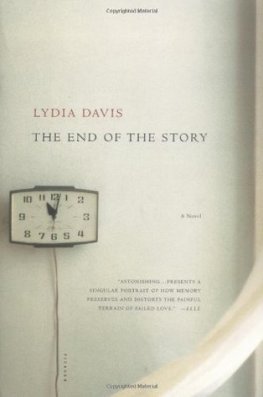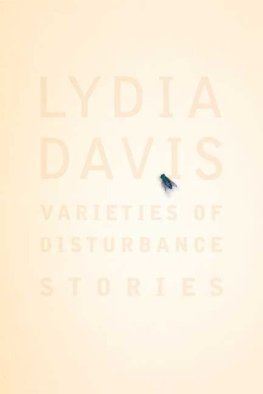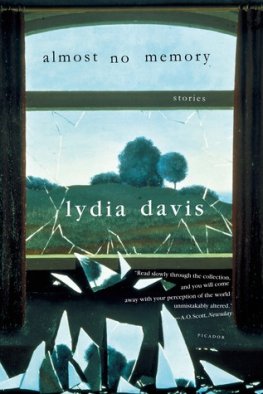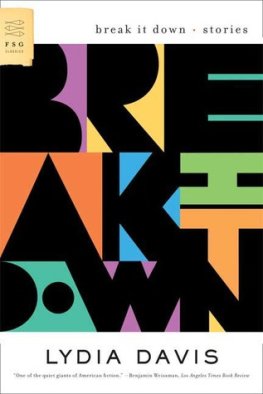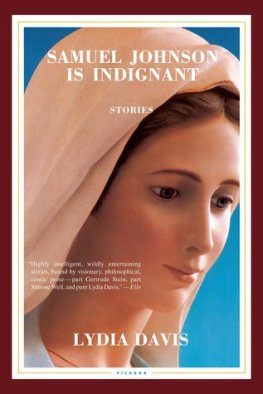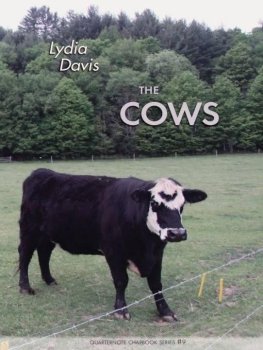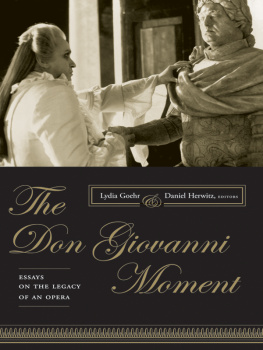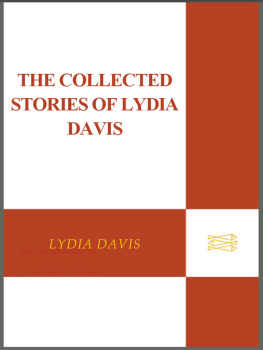Lydia Davis - Essays One
Here you can read online Lydia Davis - Essays One full text of the book (entire story) in english for free. Download pdf and epub, get meaning, cover and reviews about this ebook. year: 2019, publisher: Farrar, Straus and Giroux, genre: Detective and thriller. Description of the work, (preface) as well as reviews are available. Best literature library LitArk.com created for fans of good reading and offers a wide selection of genres:
Romance novel
Science fiction
Adventure
Detective
Science
History
Home and family
Prose
Art
Politics
Computer
Non-fiction
Religion
Business
Children
Humor
Choose a favorite category and find really read worthwhile books. Enjoy immersion in the world of imagination, feel the emotions of the characters or learn something new for yourself, make an fascinating discovery.

- Book:Essays One
- Author:
- Publisher:Farrar, Straus and Giroux
- Genre:
- Year:2019
- Rating:4 / 5
- Favourites:Add to favourites
- Your mark:
- 80
- 1
- 2
- 3
- 4
- 5
Essays One: summary, description and annotation
We offer to read an annotation, description, summary or preface (depends on what the author of the book "Essays One" wrote himself). If you haven't found the necessary information about the book — write in the comments, we will try to find it.
Essays One — read online for free the complete book (whole text) full work
Below is the text of the book, divided by pages. System saving the place of the last page read, allows you to conveniently read the book "Essays One" online for free, without having to search again every time where you left off. Put a bookmark, and you can go to the page where you finished reading at any time.
Font size:
Interval:
Bookmark:
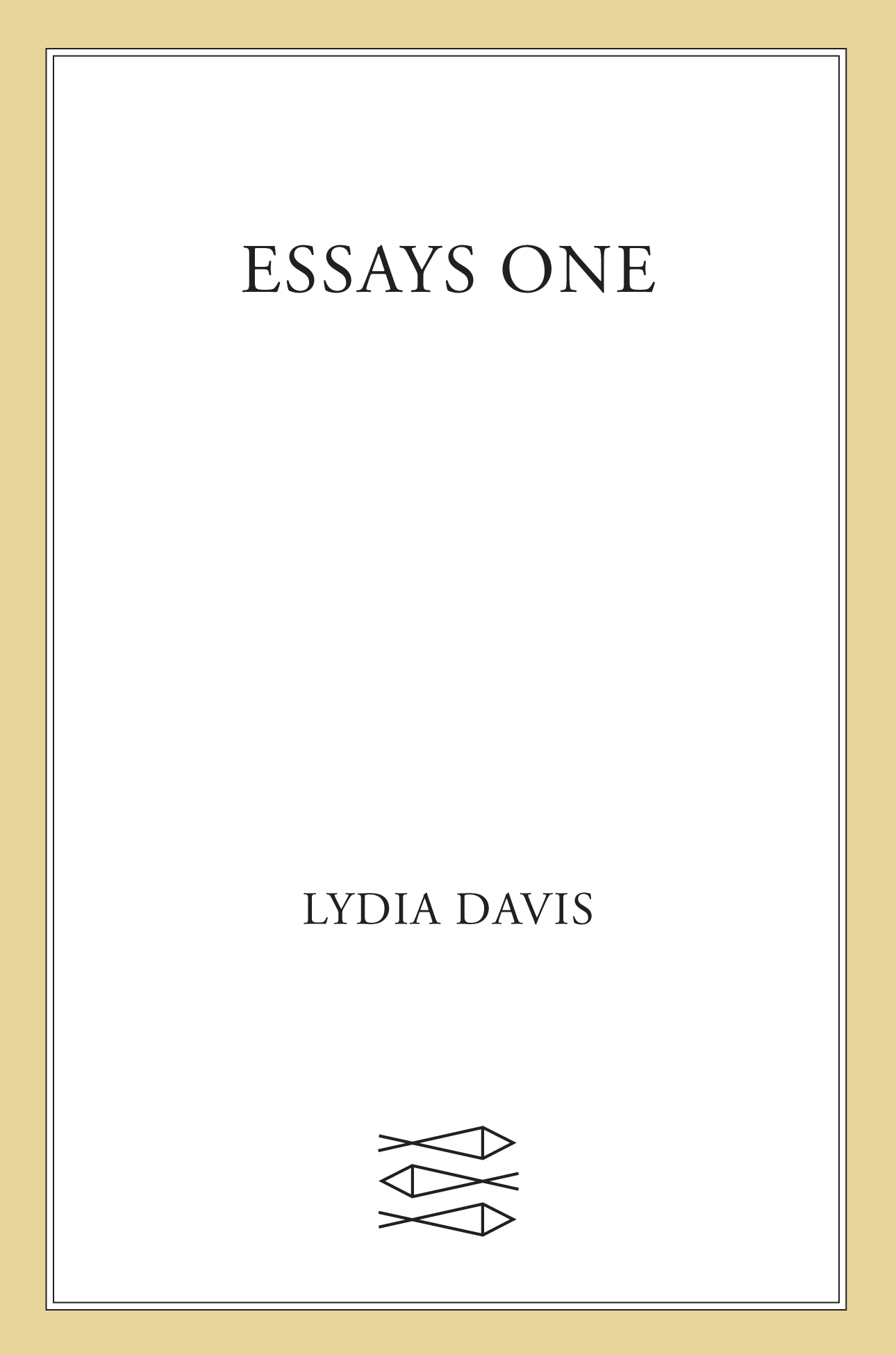

The author and publisher have provided this e-book to you for your personal use only. You may not make this e-book publicly available in any way. Copyright infringement is against the law. If you believe the copy of this e-book you are reading infringes on the authors copyright, please notify the publisher at: us.macmillanusa.com/piracy.
This book came about quite naturally: I thought it was time to collect the pieces of nonfiction I had had occasion to write over the decades and bring them together in one place. Since there were quite a number of them, I then had to decide whether to make one thick volume or two more reasonable ones. I summoned opinions and votes, weighed pros and cons, and, in the end, decided on two. They would reflect, to some extent, two of the main occupations of my lifewriting and translating. This is the first book; the second will concentrate more single-mindedly on translation and the experience of reading foreign languages.
What I have collected here are essays, commentaries, reviews, prefaces, observations, analyses, and a few talks. The subject of writing predominates, inevitably, but the subject of translation does make the occasional appearance, as do the visual arts, the writing of history, the figure of Jesus, memoir, and memory. The earliest pieces were written in the late 1970s and early 1980s, the latest within the last year or two. They range in length from my quite long, digressive, and example-laden recommendations for good writing habits down to a response to the word gubernatorial and a summary description of five favorite short stories.
In reading through and preparing this collection, I have sometimes made small changes, either minor stylistic revisions or, in a couple of cases, the combining of two pieces into one. What had been a theoretical question before I began preparing the collectionwill I revise published pieces or not?was immediately answered as I began reading, since, even if most of the published pieces had already been extensively and closely revised, I could not leave untouched something that bothered me, even a little. I felt free, for example, to replace trolley tracks in them by trolley tracks running through them if I liked it better, or a plain descriptive title by one that struck me as more interesting.
I had also asked myself whether I would let an opinion stand if I no longer agreed with it. As it happened, however, I found that I did not generally disagree with what I had written years beforewhether two years or forty-some. Once, only, in a review of a translated book, I was more dismissive of a translators work than I would be now, but for quite other reasons I have not included that review (interesting though the writer was and isI highly recommend the novels of the Southern French author Jean Giono).
Forms and Influences I
The traditional literary formsthe novel, the short story, the poemalthough they evolve, do not disappear. But there is a wealth of less traditional forms that writers have adopted over the decades and centuries, forms that are harder to define and less often encountered, either variations on the more familiar, such as the short-short story, or intergenericsitting on a line between poetry and prose, or fable and realistic narrative, or essay and fiction, and so on.
I would like to discuss some of these more eccentric forms, and specifically some of the ones I have read and thought about over the years as my own writing has evolved. So this essay includes something about my writing but is predominantly an excuse to study and read from other peoples writing, both poetry and prose.
I think of myself as a writer of fiction, but my first books were slim small-press books often shelved in the poetry section, and I am still sometimes called a poet and included in poetry anthologies. It is understandable that there may be some confusion. For instance, my collection of stories titled Samuel Johnson Is Indignant contains fifty-six pieces, including what could roughly be described as meditations; parables or fables; an oral history with hiccups; an interrogation about jury duty; a traditional, though brief, story about a family trip; a diary about thyroid disease; excerpts from a bad translation of a poorly written biography of Marie Curie; a fairly traditional narrative about my father and his furnace, though ending in an accidental poem; and, scattered through the book, brief prose pieces of just one or two lines as well as one or two pieces with broken lines.
When I began writing seriously and steadily in college, I thought my only choice was the traditional narrative short story. Both my parents had been writers of short stories, and my mother still was. Both of them had had stories published in The New Yorker, which loomed large in our life, as some sort of icon, though an icon of exactly what Im not suregood writing and editing, urban wit and sophistication? By age twelve, I already felt I was bound to be a writer, and if you were going to be a writer, the choices were limited: first, either poet or prose writer; then, if prose writer, either novelist or short-story writer. I never thought of being a novelist. I wrote poems early on, but to be a poet was somehow not an option. So if, eventually, some of my work comes right up to the line (if there is one) that separates a piece of prose from a poem, and even crosses it, the approach to that line is through the realm of short fiction.
In college, when I told one intelligent friend of mine, with confidence and exuberance, that my ambition was to write short stories and, specifically, to write a short story that would be accepted by The New Yorker, he was startled by my certainty. He was also somewhat scornful, and suggested that maybe this should not be the full extent of my ambition. I was so surprised by his reaction that the Manhattan street corner where we were talking is engraved on my memory: Broadway at 114th Street. My fixed ideas had been shaken.
Although I now did not have quite the same confidence in The New Yorker, I did not immediately see an obvious alternative to writing short stories, so I continued to work in that form and develop in that direction for the next several years, though the subject matter of the stories gradually moved away from the most conventional. I found the writing difficult; it was pleasurable or exciting only at moments. I worked on one short story for months and months; I spent about two years on another one. I followed the oft-repeated advice, which was to combine invented material and material from my own experience.
My reading might have shown me other possibilities. In addition to a healthy diet of the classic short-story writers, such as Katherine Mansfield, D. H. Lawrence, John Cheever, Hemingway, Updike, and Flannery OConnor, I was already reading writers who were more unusual formally and imaginatively, such as Beckett, Kafka, Borges, and Isaac Babel.
I was in my early teens when I first laid eyes on a page of Beckett. I was startled. I had come to it from books that included the steamy novels of Mazo de la Rochethough not too steamy to be included in a very proper girls school libraryand the more classic romances of Jane Eyre and Wuthering Heights, as well as the social panoramas of John Dos Passos, the first writer whose style I consciously noticed and relished. Now here was a book
Font size:
Interval:
Bookmark:
Similar books «Essays One»
Look at similar books to Essays One. We have selected literature similar in name and meaning in the hope of providing readers with more options to find new, interesting, not yet read works.
Discussion, reviews of the book Essays One and just readers' own opinions. Leave your comments, write what you think about the work, its meaning or the main characters. Specify what exactly you liked and what you didn't like, and why you think so.

